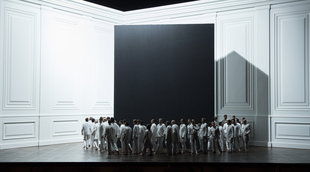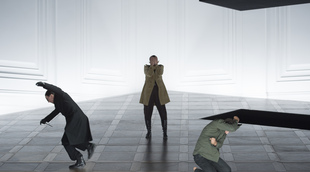 © Salzburger Festspiele / Monika Rittershaus
© Salzburger Festspiele / Monika Rittershaus
Lot of open questions, the audience remains clueless, some show their disappointment and incomprehension after a new interpretation of Ludwig van Beethoven's only and beloved opera Fidelio. It is this year's main new opera production of the acclaimed Salzburg Festival. This piece is for most music lovers the incarnation of a freedom drama and the triumph of love. The German director Claus Guth has put his hands on this drama of his compatriote to convert it to a revolutionary new interpretation. None of the spoken texts remain, every word is exchanged with sighs or sphaeric sounds or noises. So the story is fragmented and listed up as a puzzle always interrupted by short interludes of light and sound installations.

Leonore enters the stage, the curtain still closed, one big sigh and she enters her new role as Fidelio, as the curtain is lifted.
The stage design by Christian Schmidt leads the audience into a corner of a big bright white and empty room. No doors, it is the edge with no exit which makes everybody a prisoner of his destiny. An alter ego of Leonore appears, communicating in signlanguage and ties Leonore's hair. This alter ego accompagnies her throughout the evening, expressing Leonore's inner feelings and thoughts. Rocco is an elegant dressed up butler, serving for the tyran Pizarro. A dark black cube descends on the stage and takes over a central position. People move around it like at the Kabah, or the cube itself is turned around, for once lifted to open the view on Florestan's grave. It might be the symbol of the destiny, the inner prison of our civilisations feeling. Feelings, emotions which don't take place during the evening. There is no interaction between the characters, no relief and no love between the couples. The redeemed Florestan is marked by the agony of his imprisonment and only moves in spastic gestures, constantly in fear of further tortures and suffering by any noises in his regained freedom. In the end he is shot dead within the triumph ceremony out of the dark. So there is no liberation for us. It is the brutality of the interpretation, denying salvation and marking the hopelessness of mankind put in bright daylight and cold neutral luxury environment which grabs the audience. The music expresses another story bringing up the conflict to this interpretation on stage.

The Vienese Philharmonic Orchestra has a strong relation to Ludwig van Beethoven, the demands of the realisation of his compositions actually led to the foundation of this orchestra. The classic spirit can still be felt. Franz Welser Möst conducts the big and beautifully playing orchestra with vivid spirit and drives them in demanding speed. He concentrates on a harmonious flow, avoiding dramatic summits. Thus puts the singers of this new production under pressure. Adrianne Pieczonka as Fidelio has considerable problems in pronouncing swiftly the text and conducting her voices through the ups and downs of the partition. Her soprano overacts into colourless dramatic expression. Jonas Kaufmann gains most of the applause for a perfect presentation. He shows no difficulties. His warm coloured tenor reflects well all he has suffered and he is bright and clear up in the height, appraising god and love. Tomasz Konieczny does not succeed in his role of the devil tyrant but more due to the direction than to his voice. Hans Peter König is a safe Rocco, but lacks of serenity. The young Olga Bezsmertna shows well the qualities of her soprano in the role of Marzelline.
At the end there is hearty applause for all musicians and a lively discussion and exchange of opinion starts between the audience. Opera can be so fresh, up to date and psychological, as well as radical.
Helmut Pitsch
the 21 of August, 2015 | Print
Comments